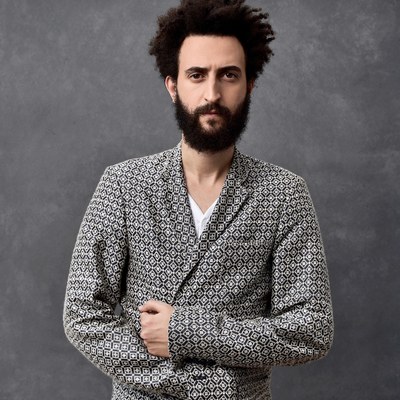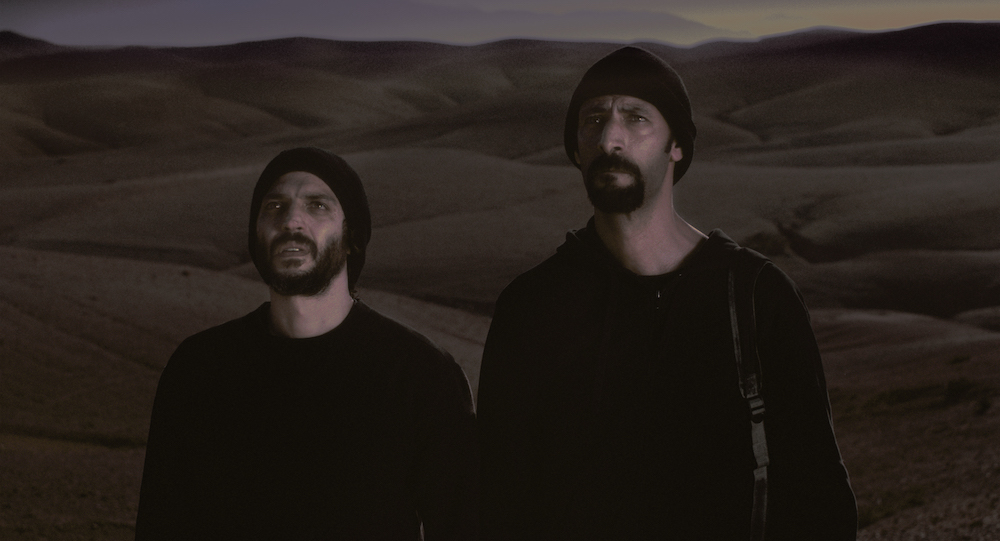A thief is arrested, but before being taken away, he manages to bury the money he stole, on a hill in the desert of Morocco. Ten years later, he comes back to reclaim it only to find out that the site of his buried treasure has been covered by a mausoleum honoring an “Unknown Saint” — as the brass plaque outside the small structure says. The village around it has benefited from this new pilgrimage site since the Saint seems to be miraculous as well.
Thus begin a series of misadventures, starring a perfectly cast Younes Bouab as “the Thief” and worthy of a Buster Keaton film, but with deeply languid Iranian influences and images that blow the audience away — both for their simplicity and their beautiful cinematic use of the Moroccan landscape.
So much about ‘The Unknown Saint’ is simply wonderful. The choices of actors who, throughout, help to tell the story with such self-assured character choices that I felt I was watching a much more seasoned filmmaker. In fact, ‘The Unknown Saint’ is Alaa Eddine Aljem’s first feature film! The theme, which bypasses the typical Arab cinema narrative always focused on social drama, and instead makes for a film that could have taken place in the South of Italy or even Mexico — if the characters spoke a different language. And speaking of language, the script, which devotes as much time to silence as it does to meaningful dialogue.
I walked away from ‘The Unknown Saint’ with a newfound love for Arab cinema, if Aljem’s film can even be called that. Between the Iranian cinema references and a few Sergio Leone spaghetti western moments, the film turns into a perfect choice for international audiences everywhere. It does help that the project is supported in part by the Doha Film Institute, where great world cinema finds its wings these days…
And the idea that we can root for a character who is so clearly a “loser” from beginning to end, even knowing that he stole the money and thus we should be against him, made me realize I was in the presence of a new world cinema great.
The story behind the scenes for Aljem and his producer, the Italian Francesca Duca is also perfectly filmy. They met while in film school in Brussels, decided to create a production company, moved to Aljem’s native Morocco and the rest, as they say, is history. But I’ll let them tell the story, they do it so much better than I!
Following is an interview with Duca and Aljem, from this year’s Cannes Film Festival.
I read something about how you took inspiration from the fact that Moroccans need some winds of change. So how do you feel your story relates to that?
Alaa Eddine Aljem: For me the story is about a micro society that is in movement, that is in front of change. Between two parts — an old ancient traditional part and a modern one that is coming but not yet there. Between the faiths, the spiritual part and the material, money part and in this way it’s related to Morocco. In my POV Morocco is on a verge of a change.

It’s sort of a balancing act now between tradition…
Aljem: There is a new direction that needs to be taken but it’s not yet chosen. Something is happening but we don’t know what.
Do you think that money is the new religion for the world?
Aljem: I think in the world we live in today we have a tendency to view money as something very holy. There is almost nothing as holy as money in our lives. And even our relationship with faith and belief is no longer something vertical, it’s very horizontal. So it gives space to transactions. We deal with it almost as we deal with all other transactions we do in our everyday life.
I love the film, but I also love what happened behind the scenes of this film. The idea that you two are also a couple and you Francesca, moved to Morocco to help create with Alaa a film industry of independent cinema. So Morocco is not just a beautiful location where big budget films get shot and nothing good comes as a result. Can you talk about how it all came about?
Francesca Duca: We met at film school in Brussels, where we both for the first time in that school of cinema, were accepted in the Master’s program. Meaning we hadn’t attended from the first to the fourth year but arrived at the fourth year for a Master. In fifty years of that school it was the first time it happened. The year before Alaa had come in and then I. We met because when you arrive at this school you have to make your final film with another person. And we immediately found ourselves in this duo where I was the production director and he was the filmmaker. And on my film, he did the production direction and I was the filmmaker. One day, I was outside smoking a cigarette, and he doesn’t smoke but found himself there for I don’t know what reason and we both began to talk. We wanted to open a production company but I said “I don’t want to do it in Italy” and he replied “I don’t want to stay here.” We thought about Paris maybe. Once our story became also a love story, we took a trip to Marrakech, and we found ourselves so happy there. For me it was like love at first sight for the city. We met a few people who said “why don’t you come here, no one here produces documentaries!” No one produces shorts or independent cinema. Everyone wants to produce the grand productions in Morocco as a filming location.
We thought we’d try, founded a company called Le Moindre Geste, meaning the smallest gesture, with a bit of difficulty at first. But now we’re making arthouse films and meanwhile Alaa was writing and writing and that’s how the film was born.
What did you think when you first heard his idea for this story?
Duca: The first time I heard his pitch I thought WOW! But I was also afraid because to make a first film in such an “burlesque” funny tone is a risk. Everything is being held together by a thread, otherwise it just becomes a parody.
His talent, apart from his writing which is always elegant, is how Alaa accompanies his actors, he doesn’t laugh at them, he never looks at these characters with a pretentious outlook. They are always very dignified even if the character can be called a “loser”.
What I loved about your film is that you don’t get lost in social drama, rather tell a universal story that could have happened anywhere. Was it difficult to tell such a story, in a world that wants to hear about the “complicated” aspect of being an Arab?
Duca: In our production house we really hand select projects. We don’t want to talk only about a problematic Morocco and we try to get away from social drama but present films which are different. This film we are very happy about because we got away from the theme of the drama… Most films that came even to Italy in the last few years confirm this thesis that Arabs can only be a certain way and so how can they be a part of the Western world and integrate in Europe. And those films come out, they end up being talked about on the right wing media and the reviews confirm the narrative.
Aljem: For me that was one of the most important points. When I first had the idea and started to think about it as my first film project, I had lots of feedback telling me, “you should go with something with strong social background because otherwise it will be very difficult for a first movie to travel internationally.”
There are themes that are very well identified abroad like terrorism, integration, women integration, immigration. You should be in those areas, they said. And for me there was no way to make a movie about this just because it’s something that will help to shine a spotlight on the movie afterward. And I think also that all the movies we see coming from the Arab world in these last few years are all about these subjects and I think we have other things in our culture that we can talk about. We can explore other subjects or other forms of narrations.

How did you find your leading man and all your actors?
Aljem: I really tested a lot of actors. I don’t think we have a lot of actors in Morocco but I think I’ve seen all of them! We rehearsed some scenes with all the actors for all the leading roles. The older women are not professional actors. I’ve seen 90-year old women for the parts that we have. We did castings for everyone except the leading role. I had a few physical criteria that he was the only one to possess. I needed someone with whom we would have empathy quite easily. Immediately so he needed to look like a thief but also nice. So you can have empathy for him. And Younes Bouab had this quality. And we had already worked together on another movie so I knew I could work with him.
I feel like I’ve seen him in another film, I’ve got to look him up…
Aljem: He looks familiar also. He looks like someone we know, me too when I met him I thought the same thing, the first time. It helps to get a connection with his character very quickly because you feel that you know him before.
I wanted actors who could play with different rhythms but also play with silences — with their bodies and their looks. And sometimes that can be very frustrating for an actor because they would spend two or three hours on the set and would just sit there. Feeling like perhaps he wasn’t doing anything. But that was enough for that kind of scene.
Who were your cinematic influences while growing up?
Aljem: Well, I love Iranian cinema. I love all the [Abbas] Kiarostami, I love the minimalistic part of that and the aesthetics. And I love how they tell you some very strong human stories but with small actions and gestures. I relate very well to this. I also love the burlesque cinema of Buster Keaton and Jacques Tati, the Scandinavian humor, something in the Arab world like Elia Suleiman.
Duca: My cinematic influences were Italian movies, like Pasolini, and Fellini, but also “commedia all’Italiana”. When we met in film school I let Alaa discover movies like ‘I Soliti Ignoti’ and he really loved it and said “this could be Morocco!”


